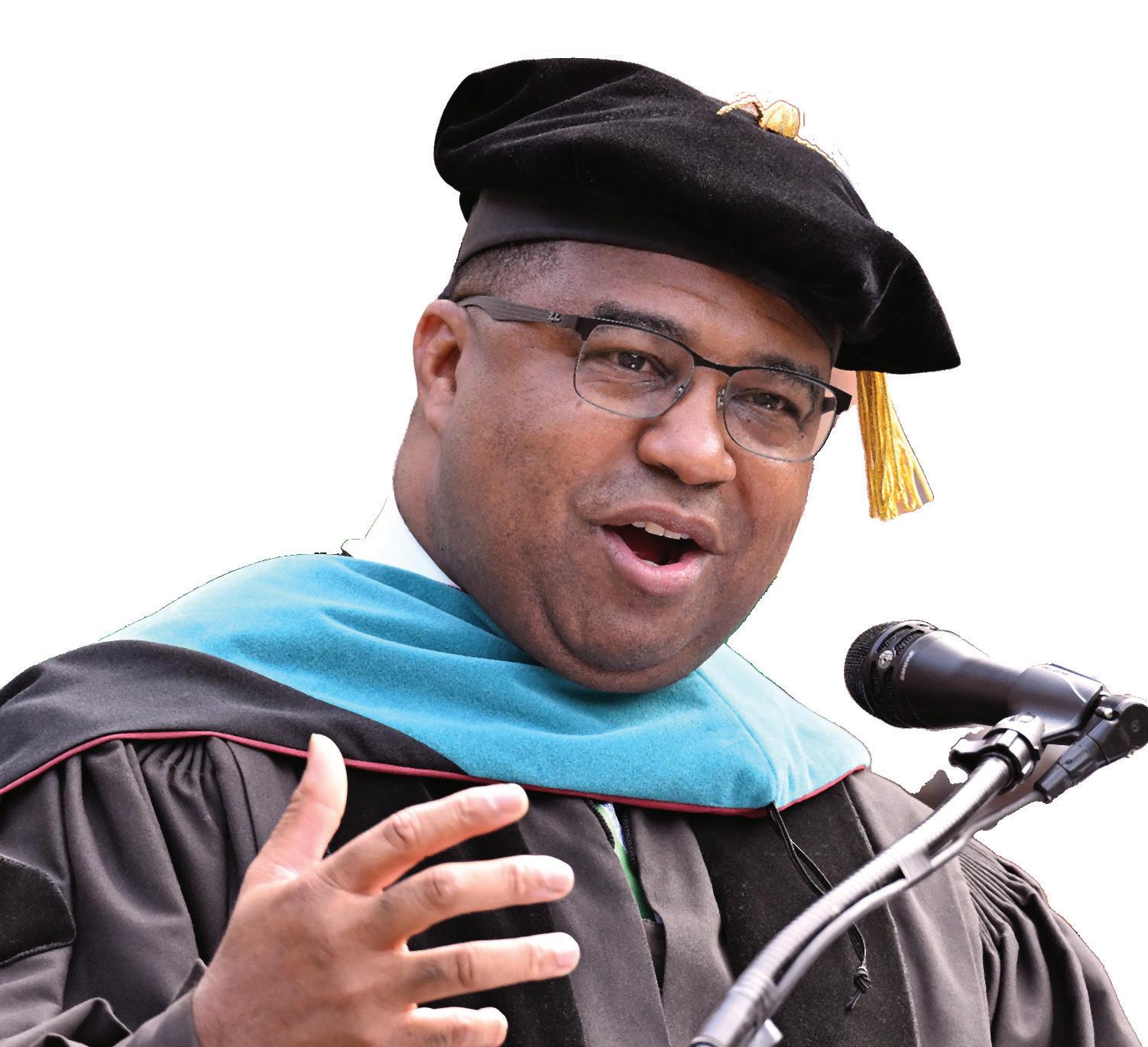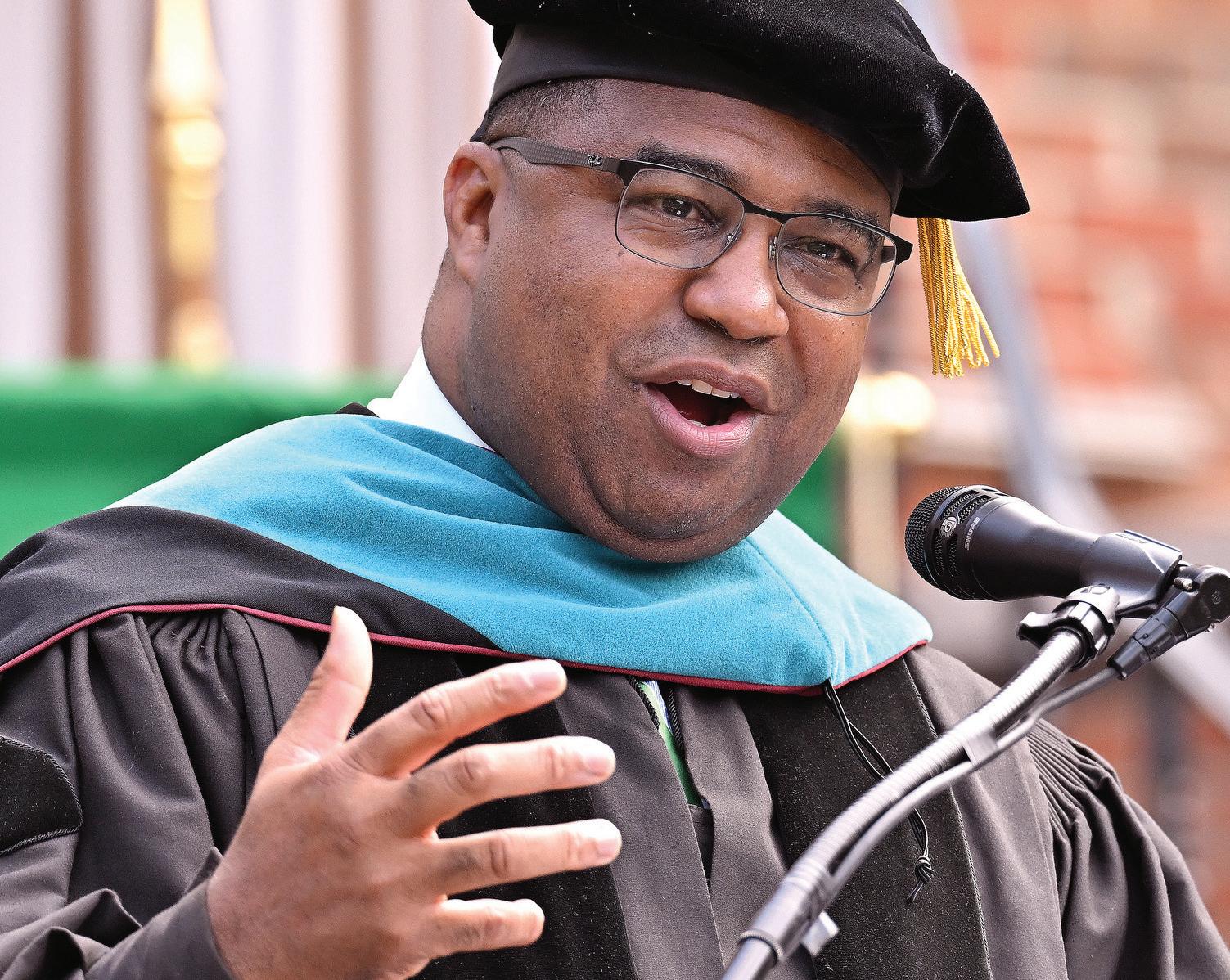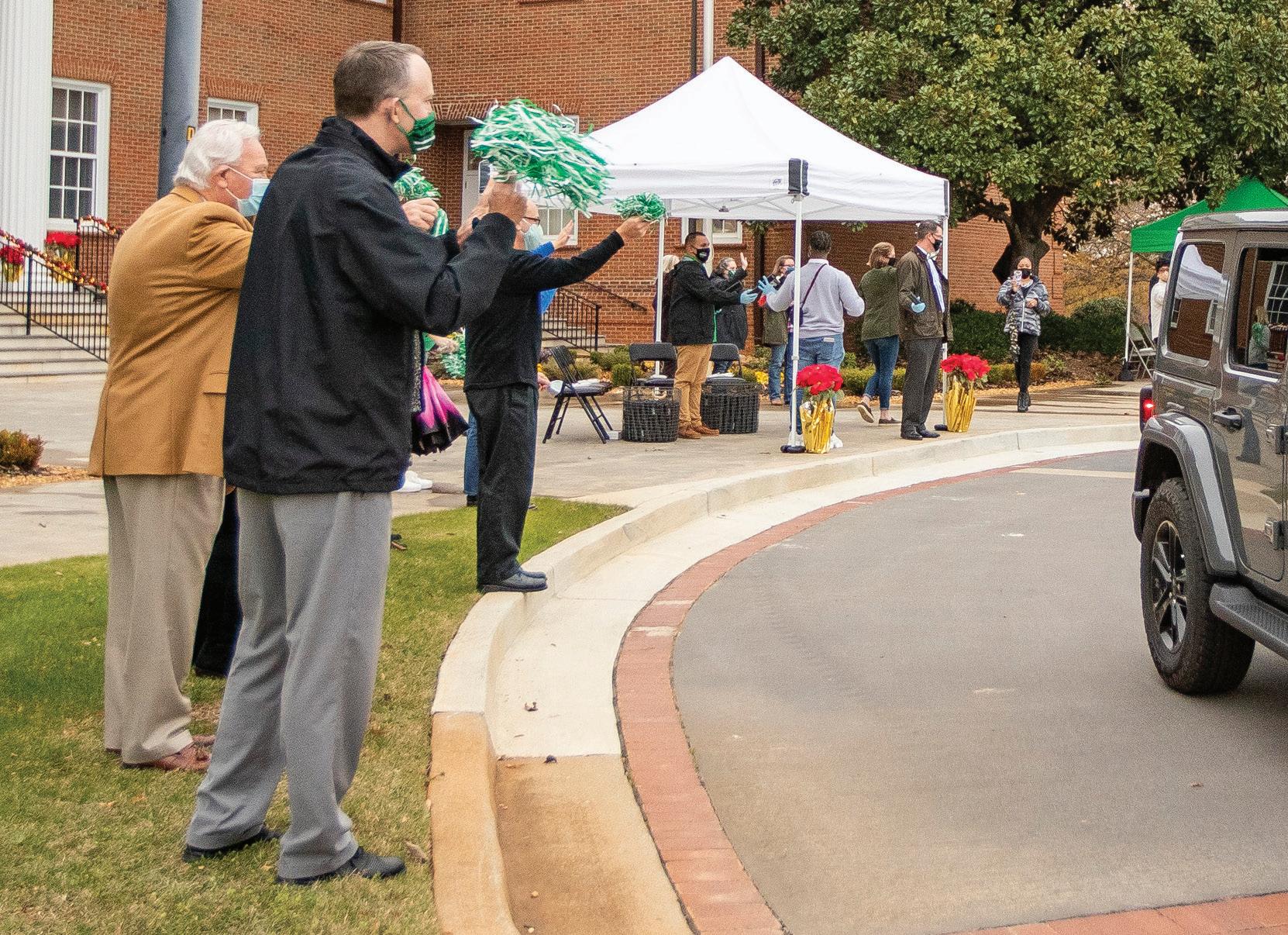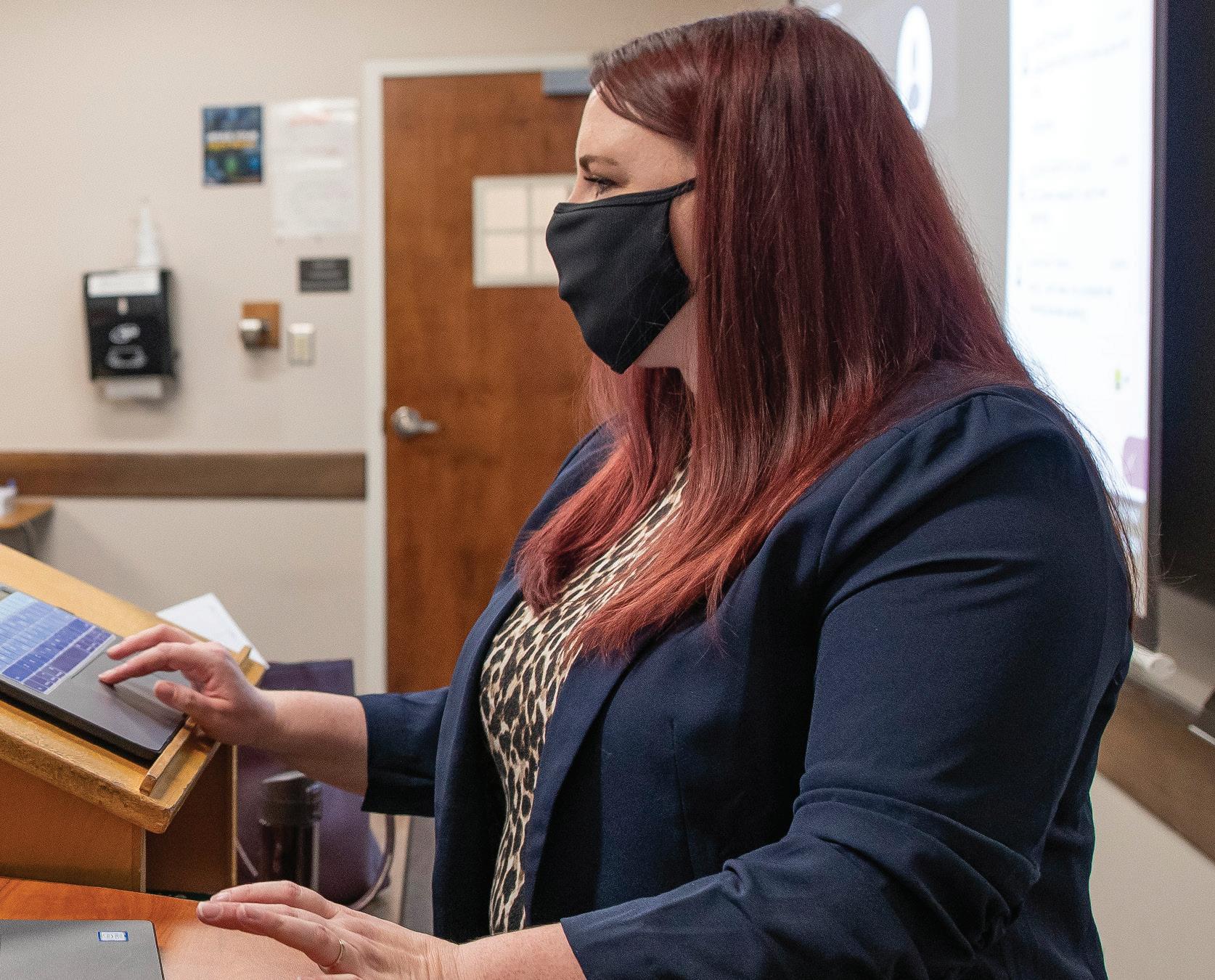Commencement 2024
Upstate Talent Forum
UNIVERSITY OF SOUTH CAROLINA UPSTATE
Address to the graduating class
UNIVERSITY OF SOUTH CAROLINA UPSTATE

Upstate Talent Forum
 Dr. Russell Booker CEO of the Spartanburg Academic Movement
Dr. Russell Booker CEO of the Spartanburg Academic Movement
Upstate Talent Forum
It is my great honor and privilege to share with you this copy of the Commencement Address from the University of South Carolina Upstate's 2024 Spring Commencement ceremony. This day was a special one, a time to celebrate your remarkable achievements and mark the beginning of a new chapter in your lives.
This Commencement Address—delivered by Russell Booker, CEO of the Spartanburg Academic Movement—reminded us of the resilience, adaptability, and strength of our university community, particularly during the pandemic. Despite the unprecedented challenges posed during that time, our students, faculty, and staff demonstrated extraordinary courage, determination, and perseverance.
Upstate Talent Forum
We all learned valuable lessons about the importance of resilience, compassion, and solidarity. We witnessed the power of innovation and collaboration in overcoming obstacles and finding creative solutions to complex problems. And we were inspired by the commitment of our university community to uphold our mission of excellence in teaching, research, and service.
I hope you will revisit Dr. Booker’s words whenever you need guidance or encouragement during the next steps of your journey. You are ready to Reach Greater Heights. I am proud of you. Your university is proud of you. And we will always be here for you.
 Bennie L. Harris, Ph.D. Chancellor, USC Upstate
Bennie L. Harris, Ph.D. Chancellor, USC Upstate
Address to the graduating class of 2024
Dr. Russell Booker, CEO of the Spartanburg Academic MovementChancellor Harris, Board of Trustees, Board of Commissioners, Faculty & Staff, Family, Friends, and distinguished graduates – It is indeed an honor to join you here today and share in this special occasion with each of you.
I am especially pleased to stand among you on this beautiful evening with an opportunity to have a “do-over” with this graduating class. Some of you are aware that I spent a decade leading District Seven Schools here in Spartanburg County. I retired in June 2020 before assuming my current role as the CEO of the Spartanburg Academic Movement. That spring of 2020 is a period of my life that I won’t soon forget and I know you feel the same. You all remember March of 2020? Like you, I had hoped it would be a special time for me to finish something I had started some 29 years prior. A time to do the very things that you didn’t have an opportunity to do. You see, I relished my time as an educator and especially those moments with my high school seniors. We had opened a brand-new Spartanburg High School that fall, and I looked forward to so much:
• The spring concerts in our new fine arts facilities
• Spring sports at the new track, baseball and softball stadium, tennis complex
• The Senior Prom
• Senior Recognition, Honors Day, Yearbook Day
• Graduation – A moment to honor you all and attend what would be my last graduation following 20 consecutive years of participating in what was the most special time of year for me.
• It was to be a moment for me to bid farewell to friends, colleagues, and a community that meant so much to me.
You all hold a special place in my heart, not only because of what you missed out on, but because of how you persevered. There are many words I could use to describe this Class of 2024 – But the one word that comes to mind is RESILIENT.
I know people throw this word around a lot these days, so I am not going to spend today talking about resilience. You have demonstrated that. Resilience is indeed a character trait that I have come to learn is essential in the times we find ourselves in. You have learned that difficult moments will come your way … And in some instances, we just have to suck it up, get over, and push on. The times we live in will require you to add to your resilience a few other character traits that shaped our learning during what was the most disruptive period of our lifetime. One thing I have come to know is that we learn in many different ways. In most instances we learn and grow by taking in new information. But in some instances, we grow by unlearning things that have shaped us through our experiences. It is this unlearning that I want to focus on in my remaining time with you this evening.
President Lincoln wrote a 10-sentence speech in 1863 that would speak to a divided nation. In the first sentence he said he said that 87 years ago our forefathers brought forth on this continent a new nation conceived in liberty and dedicated to the proposition that all men are created equally. Sentence 2 – We are now engaged in a great civil war testing whether a nation so conceived and so dedicated can long endure … testing whether a nation so conceived and so dedicated can long endure … testing whether our nation can long endure.
Just about every day, I hear politicians on both sides of the aisle pronouncing that this year’s election is the most important election in this nation’s history. Is that true? I can’t say. And know that I am not here to deliver a political graduation address. But I do believe we are in one of those testing periods that President Lincoln so prophetically spoke about in his call to action.
I believe we are still engaging in battle at times as a nation. It’s not a physical war between North and South but rather an ideological war that lacks civility – not a civil war, but a civility war. We are still being tested as a nation, and I believe that, like President Lincoln, “It is for us here to be dedicated to the great task that remains before us.” Frankly, it is my hope that you and the generation ahead of you will be the generation to set us on the right course.
But it will require you to unlearn some things that may be a bit more difficult for my generation and the ones ahead of me to unlearn. There are lessons that I believe we can draw from the Spring of 2020 and subsequent that can help us heal a divided nation.

It struck me that many of very things we were required to do – that were necessary to slow the spread of COVID and to protect ourselves and one another – are in direct conflict with what it will take for us to heal. Think about it for a moment.
Social Distancing
We became pretty adept at putting space between ourselves and others in an effort to lower our risk of contracting the virus. I remember graduation in 2020 – In Spartanburg we were fortunate to hold one, as I know some of you didn’t have that opportunity. You were given 2 tickets, told to report early, not to drink water (bathrooms would be closed), spread out on a football field that spanned the entire 100 yards, don’t shake hands as you received your diploma and go straight to your car after the ceremony (y’all didn’t follow those instructions).

As we reflect on those moments we endured, it’s evident that social distancing, once a necessity for our well-being is also a metaphor for the social, ideological, political, and racial distances that continue to separate us. We mastered the art of keeping physical distance between ourselves and others to mitigate the spread of a virus, and we continue to hold fast to the barriers that prevent us from truly connecting on a deeper level.
Today, you stand on the threshold of a new chapter of your life. As you take this next step, I hope you will come to know that our social distancing, while necessary for physical health, has taken a toll on our social fabric. You cannot afford to remain distant from one another if you are to truly understand and address the challenges we face. I implore you today to actively seek proximity — to one another and to the problems that we are calling on you to help solve.
Getting proximate requires courage and empathy. It means stepping out of our comfort zones, reaching out to those whose experiences differ

from our own, and listening with an open heart and opening mind. It also means dismantling the walls that separate us and building bridges of understanding, compassion, empathy, and unity. So how do we begin to do this? I’m glad you asked.
Wear a Mask
I want to draw your attention to something that became an ever-present symbol of that time – the mask. This mask I hold in my hand is not just a piece of fabric; it’s a reminder of the challenges we faced and the sacrifices we made. As the high school class of 2020, you were intimately familiar with this symbol, as it became a part of your graduation regalia.
In 2020, we outfitted our students with masks, not as fashion statements, but as protection against an invisible threat. Yet, beyond its practical purpose, the mask also became a metaphor for the barriers that divide us as a society. The debate over wearing masks became yet another battleground in our already divided nation.
I won’t delve into the politics of masks; that’s not the purpose of our gathering today. Instead, I want to emphasize the significance of removing our metaphorical masks – the facades we wear to conceal our true selves.
I remember the graduation ceremony of 2020, where the joy of the occasion was tinged with an air of solemness by the masks. As I handed out diplomas, unable to share my smile obscured by cloth, I hoped that my genuine warmth and congratulations transcended the barrier of fabric. Just as I wished my mask could reveal my smile that day, so too I pray for authentic, trustworthy, and genuine people to step up and lead. It’s a scary proposition, exposing our true thoughts, feelings, and vulnerabilities to the world. But it’s also an act of courage, for it is through authenticity that true proximity and connections are forged.

This evening I challenge you to see beyond the masks that others wear – not just the physical masks, but the emotional barriers we all put up to shield ourselves from others. Just as it was difficult to gauge the emotions of those around us while wearing masks, so too is it challenging to truly understand one another when we hide behind layers of pretense. William Stafford reminded us that “The messages we give, yes, no, or maybe should be clear. The darkness around us is deep.”
Class of 2024, as you move forward, strive to assume the best about others, to look past preconceived notions, prejudgments, and stereotypes, and to embrace the vulnerability of authenticity. For it is only by removing our masks and allowing others to see the real us that we can truly connect, empathize, and understand one another.

Wash Your Hands
I battled eczema as a child, and while no longer as severe, I do have flare-ups on my hands. The pandemic wreaked havoc on my skin because as you know, washing your hands on a regular basis was an important step in protecting yourself and others. On the positive side, developing a habit of washing my hands over the last several years has likely helped me to avoid illnesses. So, I am not at all complaining about the occasional skin irritation. I still have a few of these bottles of hand sanitizer that we provided to every family at graduation.
On the flip side, many of us have developed a habit of washing our hands in both a literal and figurative sense of the word. In other words, it has become so easy for us to simply “wash our hands of someone or something” – meaning that we no longer want to be involved or associated with a person or even a group. We are living in a cancel culture – a culture with a widespread practice of cutting others off if their actions or beliefs may run contrary to yours.
I challenge you today to avoid perpetuating this norm. I believe social media has contributed greatly to this. It does not take much effort to UN someone … In other words, I can simply unlike, unfollow, unfriend or unsubscribe with no effort at all. I encourage you to take the time to promote real open dialogue and interaction when possible. To learn to engage in respectful discussions with the intent of finding common ground. To educate rather than judge by not resorting to shaming, attacking, being offensive, and to consider context over condemnation.
There is nothing wrong with holding people accountable for their actions and words, but prioritize accountability over punishment.
Class of 2024, just as we developed a habit of washing our hands, I too believe we can develop the habit of practicing forgiveness. It begins with you recognizing that we are all fallible and capable of growth and change. Make room in your interactions for redemption and forgiveness so we can create a more compassionate and empathetic community.
Self-Isolate and Quarantine
And my final bit of advice … There were moments when washing your hands, wearing a mask, and even social distancing were not enough to
prevent one from contracting the virus. I tested positive on at least three occasions over the last several years. Do you all remember what the recommendation was when this happened? That’s correct – you needed to self-isolate or quarantine.
I dreaded having to do this. My isolation area was a bedroom in our home with a bath and access to the patio outside. This became my little bubble. No one else was allowed into my bubble.
One of the sad realities that I have come to learn is that many of us have been in quarantine most of our lives. We have been living in our own bubbles. It looks like this: Our neighborhoods are made up of people who look just like us. Our houses of worship are made up of people who look and think just like us. Our friends and social circles are made up of people who look and think just like us. Our news channel, what we follow on social media, and what we read consist of people who look and think just like us. This is our bubble, and we feel safe within it. Not only do we feel safe, but what we believe and how we view the world is confirmed and validated constantly by those around us. In many cases you have even created safe bubbles within the confines of this institution.
It is my hope that when you leave here today, as college graduates, you will be open to bursting your own bubble. How do we even begin to do this? Know that it is not comfortable doing so, and it can even be challenging. But this is where growth and learning occurs. I encourage you students to embrace this discomfort and push yourself outside of your comfort zone. Actively seek out different people, perspectives, and places by volunteering, joining diverse organizations, reading, traveling to broaden your horizon and expand your understanding of the world. While doing this, approach every interaction you make with curiosity and an open mind that will challenge your biases – and we all have them.
In 1962, Dr. Martin Luther King Jr. spoke to a group of students at Cornell College in Mt. Vernon, Iowa. In his message, he said, “I am convinced that men hate each other because they fear each other. They fear each other because they don’t know each other, they don’t know each other because they don’t communicate with each other, and they don’t communicate with each other because they are separated from each other.” I challenge you to become bridge builders. Bridges foster connection and relationships, and we need more bridge builders today than ever before.
Closing
Now, the question that awaits each of you is, what’s next? This question might prove to be a bit more difficult to answer in light of a world that is constantly changing around us. How and where we work is evolving. Where and how we learn has been disrupted. The physical well-being of our community, along with the trauma, mental, and emotional well-being of those we serve, has grown exponentially.
And in the midst of these challenges, we are confronted with social, political, ideological divisions that can sometimes seem insurmountable. The challenges ahead of you are real, but so are the opportunities. You have an opportunity during this period to challenge the status quo and make a real difference. Don’t squander this moment.
USC Upstate has prepared you well for the challenges ahead, and your degree creates a necessary path for you to enter your chosen field. But I am convinced that if you are going to make a real difference in your community, it will require much more than your education. Quite frankly, it will require more than your skills and talent. Today’s challenges will require compassionate, empathetic, and committed servant leaders. Simply put, we need for you to be extraordinary.
I congratulate you on this graduation evening during this commencement service. The etymology of the word graduate comes from the Latin word gradus (meaning a step). The word commence means to begin or to start. What will you begin today? Where will your next steps take you? I am excited to find out.
Just remember,
• As you leave here today as college graduates, don’t retreat to your bubble.
• Don’t be so quick to wash your hands of others –Find space for grace.
• There is goodness in others. Be courageous enough to take off your mask and be willing to see behind the masks of others.
• There is power in proximity – so let’s draw closer and end the social distancing.
God bless all of you and congratulations, Spartans!
